日语专四2011真题 大学日本语専攻生四级能力试験问题(2011)61
大学日本语専攻四级能力试験问题(2010)

大学日本語専攻四級能力試験問題(2010)(試験時間:160分)注意:解答はすべて解答用紙に書きなさい。
第一部分一、聴解(1*20=20点)二、次の文の下線をつけた単語の正しい読み方や漢字を、後のA、B、C、Dから一つ選びなさい。
(1*10=10点)21、君の歌は調子が狂っている。
A、きょうB、くC、くらD、くる22、話し合いは和やかに進んだ。
A、すみB、なごC、にぎD、やわら23、火が勢いよく燃えている。
A、いきおB、せいC、いきうD、ぜい24、この問題は早く始末をつけたい。
A、しすえB、しばつC、しまつD、しまち25、近くの温泉からは白い湯気が立ち上がっている。
A、たんきB、とうげC、ゆけD、ゆげ26、息をころして草むらにかくれる。
A、殺B、閉C、探D、塀27、このみの服を着て出かける。
A、喜B、好C、悦D、愉28、風呂上りの顔が赤みをおびる。
A、浴B、付C、帯D、顕29、話しぶりにひとがらが表れる。
A、人情B、人柄C、事柄D、人格30、結構なお品をいただきちょうほうしています。
A、長放B、兆報C、調法D、重宝三、次の文の____に入れるのに最も適当な言葉を後のA、B、C、Dから一つ選びなさい。
(1*15=15点)31、留学先へ行ったらいきなり厳しい環境に______れた。
A、あらわB、うばわC、さらさD、やら32、山と______、谷と______桜の花が咲き満ちている。
A、くわずB、きかずC、とわずD、いわず33、______もなく嫌うことを日本語では「食わず嫌い」という。
A、わけB、はずC、ものD、こと34、登録された盗難件数はまだ______一割程度にすぎない。
A、さんのB、たんのC、なんのD、ほんの35、組員一人一人の個性を上手に______工夫をするのは厳しい作業だ。
A、まかすB、ならすC、いかすD、はなす36、理由もなく______にそうなるさまを、日本語では「ふっと」という。
日语专四2009真题 大学日本语専攻生四级能力试验问题(2009)

大学日本語専攻生四級能力試驗问题(2009)(試驗時間:160分)注意:解答はすべて解答用紙に書きなさい第一部分一、聴解(1×20=20点)二﹑次の文の下線をつけたの正しい読み方や漢字を、後のA、B、C、Dから一つ選びなさい。
(1×10=10)21.祖父の頭は、白髪で真っ白だ。
A. しらがみB. しろがみC.しらがD.しろが22.穩やかな春の一日。
A. さわB、おだC、にぎD、すみ23.秋の気配を感じる。
A. きくばりB、きはいC、けくばりD、けはい24.潮風で服が湿る。
A. しめB、じめC、なめD、ぬれ25.油断は禁物だ。
A. きんふつB、きんものC、きんぶつD、きんもつ26.ほがらかに毎日を過ごす。
A. 朗らかB、明らかC、清らかD、郎か27.こころよい風が吹いている。
A. 早いうB、快いC、好いD、清い28.30年という歳月をへだてて再会した。
A. 距B、離C、隔D、跨29.日光を全身にあびる。
A. 浴B、沐C、照D、射30.食事のしたくをする。
A. 支炊B、支度C、仕炊D、私卓三、次の文の__に入れるのに最も適当な言葉を後のA,B,C,Dから一つ選びなさい。
(1×15=15点) 31.この訪問は重要だが、滯在期間は__半日です。
A. じっさいのB、ほんとうのD,なんのD、ほんの32.高速道路を走っているとこるをスピード違反で警察に__。
A. とらえたB、おさえたC、まちがったD、つかまった33、彼は誠実で明るい性格を備えているが__人気を集めている。
A. だけにB、くせにC、ゆえにD、のみに34、大学では勉強ばかりではなく、__活動にもどんどん参加したほうがいい。
A. サークルB、サーカスC、サービスD、サーバー35、現代社会の特徵のひとつは__の激しいことではなかろうか。
A. せんそうB、きょうそうC、こうそうD、とうそう36、ちょっとした失敗であんなに__を落としてはだめではないか。
日语专四2011真题 大学日本语専攻生四级能力试験问题(2011)62
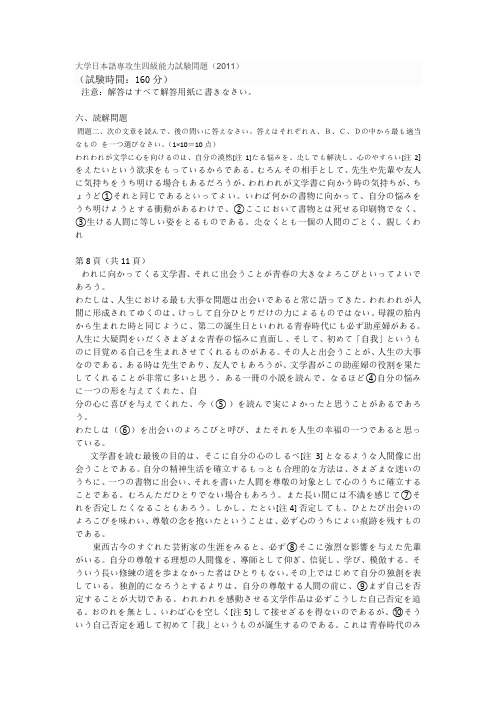
大学日本語専攻生四級能力試験問題(2011)(試験時間:160分)注意:解答はすべて解答用紙に書きなさい。
六、読解問題問題二、次の文章を読んで、後の問いに答えなさい。
答えはそれぞれA、B、C、Dの中から最も適当なものを一つ選びなさい。
(1×10=10点)われわれが文学に心を向けるのは、自分の漠然[注1]たる悩みを、尐しでも解決し、心のやすらい[注2]をえたいという欲求をもっているからである。
むろんその相手として、先生や先輩や友人に気持ちをうち明ける場合もあるだろうが、われわれが文学書に向かう時の気持ちが、ちょうど①それと同じであるといってよい。
いわば何かの書物に向かって、自分の悩みをうち明けようとする衝動があるわけで、②ここにおいて書物とは死せる印刷物でなく、③生ける人間に等しい姿をとるものである。
尐なくとも一個の人間のごとく、親しくわれ第8頁(共11頁)われに向かってくる文学書、それに出会うことが青春の大きなよろこびといってよいであろう。
わたしは、人生における最も大事な問題は出会いであると常に語ってきた。
われわれが人間に形成されてゆくのは、けっして自分ひとりだけの力によるものではない。
母親の胎内から生まれた時と同じように、第二の誕生日といわれる青春時代にも必ず助産婦がある。
人生に大疑問をいだくさまざまな青春の悩みに直面し、そして、初めて「自我」というものに目覚める自己を生まれさせてくれるものがある。
その人と出会うことが、人生の大事なのである。
ある時は先生であり、友人でもあろうが、文学書がこの助産婦の役割を果たしてくれることが非常に多いと思う。
ある一冊の小説を読んで、なるほど④自分の悩みに一つの形を与えてくれた、自分の心に喜びを与えてくれた、今(⑤)を読んで実によかったと思うことがあるであろう。
わたしは(⑥)を出会いのよろこびと呼び、またそれを人生の幸福の一つであると思っている。
文学書を読む最後の目的は、そこに自分の心のしるべ[注3] となるような人間像に出会うことである。
日语专四2011真题 大学日本语専攻生四级能力试験问题(2011)5
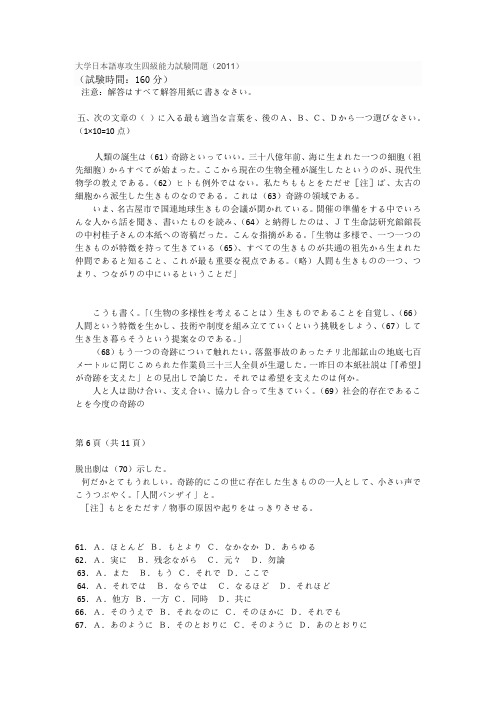
大学日本語専攻生四級能力試験問題(2011)(試験時間:160分)注意:解答はすべて解答用紙に書きなさい。
五、次の文章の()に入る最も適当な言葉を、後のA、B、C、Dから一つ選びなさい。
(1×10=10点)人類の誕生は(61)奇跡といっていい。
三十八億年前、海に生まれた一つの細胞(祖先細胞)からすべてが始まった。
ここから現在の生物全種が誕生したというのが、現代生物学の教えである。
(62)ヒトも例外ではない。
私たちももとをただせ[注]ば、太古の細胞から派生した生きものなのである。
これは(63)奇跡の領域である。
いま、名古屋市で国連地球生きもの会議が開かれている。
開催の準備をする中でいろんな人から話を聞き、書いたものを読み、(64)と納得したのは、JT生命誌研究館館長の中村桂子さんの本紙への寄稿だった。
こんな指摘がある。
「生物は多様で、一つ一つの生きものが特徴を持って生きている(65)、すべての生きものが共通の祖先から生まれた仲間であると知ること、これが最も重要な視点である。
(略)人間も生きものの一つ、つまり、つながりの中にいるということだ」こうも書く。
「(生物の多様性を考えることは)生きものであることを自覚し、(66)人間という特徴を生かし、技術や制度を組み立てていくという挑戦をしよう、(67)して生き生き暮らそうという提案なのである。
」(68)もう一つの奇跡について触れたい。
落盤事故のあったチリ北部鉱山の地底七百メートルに閉じこめられた作業員三十三人全員が生還した。
一昨日の本紙社説は「『希望』が奇跡を支えた」との見出しで論じた。
それでは希望を支えたのは何か。
人と人は助け合い、支え合い、協力し合って生きていく。
(69)社会的存在であることを今度の奇跡の第6頁(共11頁)脱出劇は(70)示した。
何だかとてもうれしい。
奇跡的にこの世に存在した生きものの一人として、小さい声でこうつぶやく。
「人間バンザイ」と。
日语专四2013真题 大学日本语専攻四级能力试験问题(2013)61
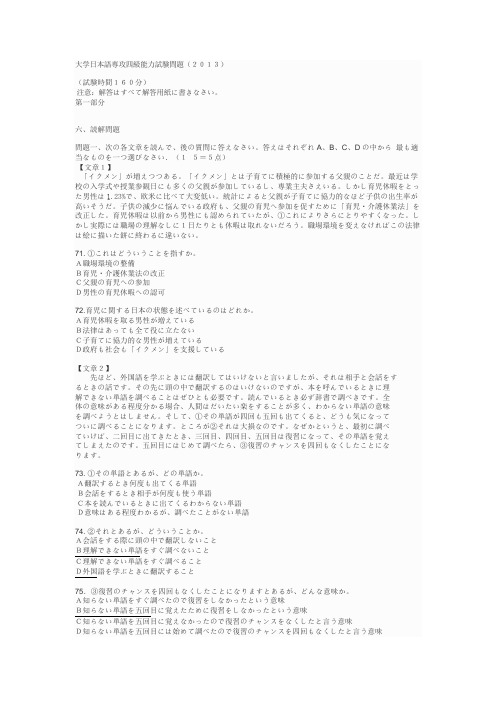
六、読解問題 問題一、次の各文章を読んで、後の質問に答えなさい。答えはそれぞれ A、B、C、D の中から 最も適 当なものを一つ選びなさい.(1×5=5点) 【文章1】 「イクメン」が増えつつある。「イクメン」とは子育てに積極的に参加する父親のことだ。最近は学 校の入学式や授業参観日にも多くの父親が参加しているし、専業主夫さえいる。しかし育児休暇をとっ た男性は 1.23%で、欧米に比べて大変低い。統計によると父親が子育てに協力的なほど子供の出生率が 高いそうだ。子供の減少に悩んでいる政府も、父親の育児へ参加を促すために「育児・介護休業法」を 改正した。育児休暇は以前から男性にも認められていたが、①これによりさらにとりやすくなった。し かし実際には職場の理解なしに1日たりとも休暇は取れないだろう。職場環境を変えなければこの法律 は絵に描いた餅に終わるに違いない。 71. ①これはどういうことを指すか。 A職場環境の整備 B育児・介護休業法の改正 C父親の育児への参加 D男性の育児休暇への認可 72.育児に関する日本の状態を述べているのはどれか。 A育児休暇を取る男性が増えている B法律はあっても全て役に立たない C子育てに協力的な男性が増えている D政府も社会も「イクメン」を支援している 【文章2】 先ほど、外国語を学ぶときには翻訳してはいけないと言いましたが、それは相手と会話をす るときの話です。その先に頭の中で翻訳するのはいけないのですが、本を呼んでいるときに理 解できない単語を調べることはぜひとも必要です。読んでいるとき必ず辞書で調べきです。全 体の意味がある程度分かる場合、人間はだいたい楽をすることが多く、わからない単語の意味 を調べようとはしません。そして、①その単語が四回も五回も出てくると、どうも気になって ついに調べることになります。ところが②それは大損なのです。なぜかというと、最初に調べ ていけば、二回目に出てきたとき、三回目、四回目、五回目は復習になって、その単語を覚え てしまえたのです。五回目にはじめて調べたら、③復習のチャンスを四回もなくしたことにな ります。 73. ①その単語とあるが、どの単語か。 A翻訳するとき何度も出てくる単語 B会話をするとき相手が何度も使う単語 C本を読んでいるときに出てくるわからない単語 D意味はある程度わかるが、調べたことがない単語 74. ②それとあるが、どういうことか。 A会話をする際に頭の中で翻訳しないこと B理解できない単語をすぐ調べないこと C理解できない単語をすぐ調べること D外国語を学ぶときに翻訳すること 75.③復習のチャンスを四回もなくしたことになりますとあるが、どんな意味か。 A知らない単語をすぐ調べたので復習をしなかったという意味 B知らない単語を五回目に覚えたために復習をしなかったという意味 C知らない単語を五回目に覚えなかったので復習のチャンスをなくしたと言う意味 D知らない単語を五回目には始めて調べたので復習のチャンスを四回もなくしたと言う意味
2011年专业英语四级考试真题及答案
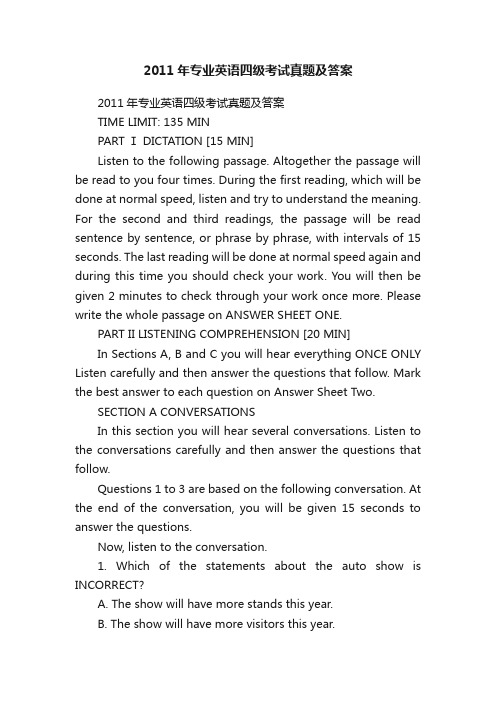
2011年专业英语四级考试真题及答案2011年专业英语四级考试真题及答案TIME LIMIT: 135 MINPART Ⅰ DICTATION [15 MIN]Listen to the following passage. Altogether the passage will be read to you four times. During the first reading, which will be done at normal speed, listen and try to understand the meaning. For the second and third readings, the passage will be read sentence by sentence, or phrase by phrase, with intervals of 15 seconds. The last reading will be done at normal speed again and during this time you should check your work. You will then be given 2 minutes to check through your work once more. Please write the whole passage on ANSWER SHEET ONE.PART II LISTENING COMPREHENSION [20 MIN]In Sections A, B and C you will hear everything ONCE ONLY Listen carefully and then answer the questions that follow. Mark the best answer to each question on Answer Sheet Two.SECTION A CONVERSATIONSIn this section you will hear several conversations. Listen to the conversations carefully and then answer the questions that follow.Questions 1 to 3 are based on the following conversation. At the end of the conversation, you will be given 15 seconds to answer the questions.Now, listen to the conversation.1. Which of the statements about the auto show is INCORRECT?A. The show will have more stands this year.B. The show will have more visitors this year.C. The number of overseas visitors will be the same this year.D. The number of exhibition days will be the same this year.2. According to the conversation, the price for a stand would include _____.A. a catalogueB. a posterC. two desksD. four chairs3. During the conversation, the man seems to be more interested in _____.A. the size of the showB. the cost of the standC. the basic furnitureD. the visitor numberQuestions 4 to 7 are based on the following conversation. At the end of the conversation, you will be given 20 seconds to answer the questions.Now, listen to the conversation.4. What is Jim interested in?A. Investing in the company's product.B. Buying a new educational computer.C. Joining the computer company.D. Reading the campaign plan.5. The advertisements will be placed in all the following EXCEPT _____.A. family magazinesB. Sunday newspapersC. morning televisionD. teenage magazines6. The advertisements are intended to be seen by _____.A. parents onlyB. children onlyC. school teachersD. whole families7. Linda sounds _____ about the success of the campaign plan.A. confidentB. hesitantC. uncertainD. delighted Questions 8 to 10 are based on the following conversation. At the end of the conversation, you will be given 15 seconds to answer the questions.Now, listen to the conversation.8. John has worked in all the following places EXCEPT _____.A. a book shopB. a paper factoryC. a schoolD. a fast-food restaurant9. From the conversation, we learn that John _____.A. has no interestB. has only one interestC. has two interestsD. has quite a few interests10. Sue Green seems to be more interested in John's experience of ____.A. working in a paper factoryB. working in a youth clubC. looking after his brother and sisterD. looking after his young friendsSECTION B PASSAGESIn this section, you will hear several passages. Listen to thepassages carefully and then answer the questions that follow.Questions 11 to 13 are based on the following passage. At the end of the passage, you will be given 15 seconds to answer the questions.Now, listen to the passage.11. According to the passage, the average age of the fleet of Delta/Northwest is _____.A. 10 yearsB. 14 yearsC. 16 yearsD. 20 years.12. It can be learned from the passage that _____.A. air journeys are quite often far from comfortableB. air travellers usually enjoy luxury during flightC. air travellers usually enjoy upgraded conditionsD. airlines always provide good in-flight entertainment13. Older planes can stay safe for more than 25 years because of the following EXCEPT _____.A. new enginesB. strong materialsC. proper maintenanceD. new interior Questions 14 to 17 are based on the following passage. At the end of the passage, you will be given 20 seconds to answer the questions.Now, listen to the passage.14. Which job will involve supervising workers using dangerous equipment?A. Assistant site manager.B. Carpenter supervisor.C. Assembly supervisor.D. Automobile service station manager.15. Who will also decide on the prices of products and services?A. Airlines' flight service manager.B. Automobile service station manager.C. Assistant site manager.D. Carpenter supervisor.16. Who may also do some of the work he supervises?A. Assistant site manager.B. Airlines' flight service manager.C. Assembly supervisor.D. Carpenter supervisor.17. Which job offers the highest salary?A. Assistant site manager.B. Automobile service station manager.C. Carpenter supervisor.D. Airlines' flight service manager. Questions 18 to 20 are based on the following passage. At the end of the passage, you will be given 15 seconds to answer the questions.Now, listen to the passage.18. Where were the two men filmed?A. In the jewelry shop.B. In the City Mall.C. Near the lorry.D. In the parking lot.19. Witnesses saw the two men _____.A. leave the lorry together.B. leave the lorry without hoods.C. run back to the lorry separately.D. run back to the lorry without hoods.20. Which of the following details is CORRECT?A. The lorry was originally painted white.B. The lorry had no registration plates.C. The shorter man was the passenger.D. The taller man was the driver. SECTION C NEWS BROADCASTIn this section, you will hear several news items. Listen to them carefully and then answer the questions that follow.Questions 21 and 22 are based on the following news. At the end of the news item, you will be given 10 seconds to answer the questions.Now, listen to the news.21. What did NASA's Constellation Programme originally plan to do?A. To set up a moon colony by 2020.B. To send astronauts again to the moon by 2020.C. To continue the current shuttle missions till 2020.D. To create more jobs for NASA till 2020.22. NASA's Constellation Programme would be cancelled mainly because _____.A. there were more important space missions.B. the space agency lacked funding for the programme.C. the current shuttle missions would continue.D. Congress failed to pass President Obama's budget.Questions 23 and 24 are based on the following news. At the end of the news item, you will be given 10 seconds to answer the questions.Now, listen to the news.23. The Russian cargo ship was sinking. What was the direct cause?A. No explanation of the problem.B. Long distance away from land.C. Slow rescue efforts.D. Severe weather.24. Which of the following was NOT mentioned as a possible means of rescue?A. Aircraft.B. Tugboat.C. Nearby cargo ship.D. Vessels at the oil rig.Questions 25 and 26 are based on the following news. At the end of the news item,you will be given 10 seconds to answer the questions.Now, listen to the news.25. Why did the singers meet in Hollywood?A. To raise money for African humanitarian efforts.B. To raise money for Haitian earthquake victims.C. To sing in memory of Michael Jackson.D. To make a recording of the original version of the song.26. Which of the following details about the news is INCORRECT?A. The organizer is one of the co-writers of the first songB. Singers will use the same recording studio as in 1985.C. The recording session is expected to last long.D. Stars from the original version will take part.Questions 27 and 28 are based on the following news. At the end of the news item, you will be given 10 seconds to answer the questions.Now, listen to the news.27. The additional 2 billion dollars will mainly be used to _____.A. upgrade its network capacityB. improve customer servicesC. develop new productsD. market more iPhones28. Where does AT&T face difficulties in particular?A. Nationwide.B. Overseas.C. In large cities.D. In remote towns.Questions 29 and 30 are based on the following news. At the end of the news item, you will be given 10 seconds to answer the questions.Now, listen to the news.29. Where is the presence of security patrols most evident?A. Where matches take place.B. Where protests may take place.C. In downtown Vancouver.D. Around the athletes' village.30. What is this news item mainly about?A. Political protests during the Olympics.B. Security operations during the Olympics.C. Olympics' security forces.D. Security measures in buildings. PART III CLOZE (20个空)[15 MIN]Decide which of the choices given below would best complete the passage if inserted in the corresponding blanks. Mark the best choice for each blank on Answer Sheet Two."Congratulations, Mr. Cooper. It's a girl."Fatherhood is going to have a different meaning and (31) _____ a different response from every man who hears these words.Some feel (32) _____ when they receive the news, (33) _____ others worry, wondering whether they will be good fathers. (34) _____ there are some men who like children and may have had (35) experience with them, others do not particularly (36) _____ children and spend little time with them. Many fathers and mothers have been planning and looking forward to children for some time. (37) _____ other couples, pregnancy was an accident that both husband and wife have (38) _____ willingly or unwillingly.Whatever the (39) _____ to the birth of a child, it is obvious the shift from the role of husband to (40) _____ of a father is a difficult task. (41) _____, unfortunately, few attempts have been made to (42) _____ fathers in this resocialization (43) _____. Although numerous books have been written about mothers, (44) _____ recently has literature focused on the (45) _____ of a father.It is argued that the transition to the father's role, although difficult, is not (46) _____ as great as the transition the wife must(47) _____ to the mother's role. The mother's role seems to requirea complete (48) _____ in daily routine. (49) _____, the father's role is less demanding and (50) _____.31. A. bring down B. bring forth C. bring off D. bring in32. A. emotional B. sentimental C. bewildered D. proud33. A. while B. when C. if D. as34. A. When B. If C. Although D. Yet35. A. considerate B. considerable C. considering D. considered36. A. care about B. care of C. care with D. care for37. A. For B. Of C. From D. Upon38. A. received B. taken C. accepted D. obtained39. A. reply B. reaction C. readiness D. reality40. A. what B. this C. one D. that41 .A. As a result B. For example C. Yet D. Also42. A. educate B. cultivate C. inform D. convert43. A. step B. process C. point D. time44. A./ B. just C. quite D. only45. A. role B. work C. career D. position46. A. a little B. just C. nearly D. almost47. A. take B. make C. carry D. accept48. A. transformation B. realization C. socialization D. reception49. A. In addition B. Above all C. Generally D. However50. A. current B. immediate C. present D. quickPART IV GRAMMAR & VOCABULARY (30道选择题)[15 MIN]There are thirty sentences in this section. Beneath each sentence there are four words or phrases marked A, B, C and D. Choose one word or phrase that best completes the sentence.Mark your answers on Answer Sheet Two.51. My uncle is quite worn out from years of hard work. He is no longer the man _____ he was fifteen years ago.A. whichB. whomC. whoD. that52. Which of the following sentences is a COMMAND?A. Beg your pardon.B. Have a good time.C. Never do that again!D. What noise you are making!53. Which of the following italicized phrases indicates purpose?A. She said it for fun, but others took her seriously.B. For all its effort, the team didn't win the match.C. Linda has worked for the firm for twenty years.D. He set out for Beijing yesterday.54. When you have finished with the book, don't forget to return it to Tim, _____?A. do youB. will youC. don't youD. won't you55. In phrases like freezing cold, burning hot, or soaking wet, the -ING participle is used _____.A. as a commandB. as a conditionC. for concessionD. for emphasis56. Which of the following italicized phrases is INCORRECT?A. The city is now ten times its original size.B. I wish I had two times his strength.C. The seller asked for double the usual price.D. They come here four times every year.57. It is not so much the language _____ the cultural background that makes the book difficult to understand.A. asB. norC. butD. like58. Which of the following italicized parts is used as an object?A. What do you think has happened to her?B. Who do you think the visiting professor is?C. How much do you think he earns every month?D. How quickly would you say he would come?59. The additional work will take _____ weeks.A. the otherB. another twoC. other twoD. the more60. Which of the following italicized parts is a subject clause (主语从句)?A. We are quite certain that we will get there in time.B. He has to face the fact that there will be no pay rise this year.C. She said that she had seen the man earlier that morning.D. It is sheer luck that the miners are still alive after ten days.61. It's getting late. I'd rather you _____ now.A. leftB. leaveC. are leavingD. will leave62. In the sentence "The manager interviewed Jim himself in the morning", the italicized word is used to modify _____.A. the objectB. the verbC. the subjectD. the prepositional phrase63. There is no doubt _____ the couple did the right thing in coming back home earlier than planned.A. whetherB. thatC. whyD. when64. The sentence that expresses OFFER is _____.A. I'll get some drinks. What'll you have?B. Does she need to book a ticket now?C. May I know your name?D. Can you return the book next week?65. Which of the following italicized phrases indicates a subject-predicate relation (主谓关系)?A. Mr. Smith's passport has been issued.B. The visitor's arrival was reported in the news.C. John's travel details have not been finalized.D. The new bookstore sells children's stories.66. Our office has recently _____ to a new computer system.A. alteredB. convertedC. transformedD. modified67. The crowd went _____ as soon as the singer stepped onto the stage.A. wildB. emotionalC. uncontrolledD. unrestricted68. Our school library is _____ closed for repairs.A. ShortlyB. quicklyC. temporarilyD. rapidly69. John is up to his eves in work at the moment. The underlined part means _____.A. very excitedB. very busyC. very tiredD. very efficient70. Victoria bumped into her brother quite by chance in the supermarket. The underlined word means _____.A. riskB. opportunityC. possibilityD. luck71. "Look at those pretty girls' skirts" is _____, because it is not clear whether the girls or the skirts are "pretty".A. ambiguousB. hiddenC. indirectD. indistinct72. House repairs, holidays, school fees and other _____ have reduced his bank balance to almost nothing.A. amountB. paymentC. expensesD. figures73. It was really _____ of you to remember my birthday.A. gratefulB. thoughtfulC. considerableD. generous74. You can go to a travel agency and ask for a holiday _____.A. introductionB. advertisementC. bookD. brochure75. The city government is building more roads to _____.A. accommodateB. receiveC. acceptD. hold76. They've lifted a two-year-long economic _____ on the country.A. enclosureB. restrictionC. blockadeD. prohibition77. Everyone is surprised that she has fallen out with her boy friend. The underlined part means _____.A. leftB. quarreledC. attackedD. defeated78. His plan is carefully prepared and full of details, so it is a very _____ one.A. elaborateB. refinedC. ambitiousD. complex79. The girl's voice was so low that we could ______ hear her.A. seldomB. almostC. onlyD. barely80. She must have been pretty _____ to fall for such an old trick.A. interestedB. gullibleC. enthusiasticD. shrewdPART V READING COMPREHENSION (20道选择题) [25 MIN] In this section there are four passages followed by questions or unfinished statements, each with four suggested answers marked A, B, C and D. Choose the one that you think is the best answer.Mark your answers on Answer Sheet Two.TEXT AWe have a crisis on our hands. You mean global warming? The world economy? No, the decline of reading. People are just not doing it anymore, especially the young. Who's responsible? Actually, it's more like, What is responsible? The Internet, of course, and everything that comes with it – Facebook, Twitter (微博). You can write your own list.There's been a warning about the imminent death of literate civilization for a long time. In the 20th century, first it was the movies, then radio, then television that seemed to spell doom for the written world. None did. Reading survived; in fact it not only survived, it has flourished. The world is more literate than ever before – there are more and more readers, and more and more books.The fact that we often get our reading material online today is not something we should worry over. The electronic and digital revolution of the last two decades has arguably shown the way forward for reading and for writing. Take the arrival of e-bookreaders as an example. Devices like Kindle make reading more convenient and are a lot more environmentally friendly than the traditional paper book.As technology makes new ways of writing possible, new ways of reading are possible. Interconnectivity allows for the possibility of a reading experience that was barely imaginable before. Where traditional books had to make do with photographs and illustrations, an e-book can provide readers with an unlimited number of links: to texts, pictures, and videos. In the future, the way people write novels, history, and philosophy will resemble nothing seen in the past.On the other hand, there is the danger of trivialization. One Twitter group is offering its followers single-sentence-long "digests" of the great novels. War and Peace in a sentence? You must be joking. We should fear the fragmentation of reading. There is the danger that the high-speed connectivity of the Internet will reduce our attention span - that we will be incapable of reading anything of length or which requires deep concentration.In such a fast-changing world, in which reality seems to be remade each day, we need the ability to focus and understand what is happening to us. This has always been the function of literature and we should be careful not to let it disappear. Our society needs to be able to imagine the possibility of someone utterly in tune with modern technology but able to make sense of a dynamic, confusing world.In the 15th century, Johannes Guttenberg's invention of the printing press in Europe had a huge impact on civilization. Once upon a time the physical book was a challenging thing. We should remember this before we assume that technology is outto destroy traditional culture.81. Which of the following paragraphs briefly reviews the historical challenges for reading?A. Paragraph One.B. Paragraph Two.C. Paragraph Three.D. Paragraph Four.82. The following are all cited as advantages of e-books EXCEPT _____.A. multimodal contentB. environmental friendlinessC. convenience for readersD. imaginative design83. Which of the following can best describe how the author feels towardsingle-sentence-long novels?A. IronicB. Worried.C. Sarcastic.D. Doubtful.84. According to the passage, people need knowledge of modern technology and _____ to survive in the fast-changing society.A. good judgmentB. high sensitivityC. good imaginationD. the ability to focus85. What is the main idea of the passage?A. Technology pushes the way forward for reading and writing.B. Interconnectivity is a feature of new reading experience.C. Technology is an opportunity and a challenge for traditional reading.D. Technology offers a greater variety of reading practice.TEXT BI know when the snow melts and the first robins (知更鸟) come to call, when the laughter of children returns to the parks and playgrounds, something wonderful is about to happen.Spring cleaning.I'll admit spring cleaning is a difficult notion for modern families to grasp. T oday's busy families hardly have time to load the dishwasher, much less clean the doormat. Asking the family to spend the weekend collecting winter dog piles from the melting snow in the backyard is like announcing there will be no more Wi-Fi. It interrupts the natural order."Honey, what say we spend the weekend beating the rugs, sorting through the boxes in the basement and painting our bedroom a nice lemony yellow?" I say."Can we at least wait until the NBA matches are over?" my husband answers.But I tell my family, spring cleaning can't wait. The temperature has risen just enough to melt snow but not enough for Little League practice to start. Some flowers are peeking out of the thawing ground, but there is no lawn to seed, nor garden to tend. Newly wakened from our winter's hibernation (冬眠), yet still needing extra blankets at night, we open our windows to the first fresh air floating on the breeze and all of the natural world demanding "Awake and be clean!"Biologists offer a theory about this primal impulse to clean out every drawer and closet in the house at spring's first light,which has to do with melatonin, the sleepytime hormone (激素) our bodies produce when it's dark. When spring's light comes, the melatonin diminishes, and suddenly we are awakened to the dusty, virus-filled house we've been hibernating in for four months.I tell my family about the science and psychology of a good healthy cleaning at spring's arrival. I speak to them about life's greatest rewards waiting in the removal of soap scum from the bathtub, which hasn't been properly cleaned since the first snowfall."I'll do it," says the eldest child, a 21-year-old college student who lives at home. "You will? Wow!" I exclaim.Maybe after all these years, he's finally grasped the concept. Maybe he's expressing his rightful position as eldest child and role model. Or maybe he's going to Floridafor a break in a couple of weeks and he's being nice to me who is the financial-aid officer.No matter. Seeing my adult son willingly cleaning that dirty bathtub gives me hope for the future of his 12-year-old brother who, instead of working, is found to be sleeping in the seat of the window he is supposed to be cleaning."Awake and be clean!" I say.86. According to the passage, "...spring cleaning is a difficult notion for modern families to grasp" means that spring cleaning _____.A. is no longer an easy practice to understand.B. is no longer part of modern family life.C. requires more family members to be involved.D. calls for more complicated skills and knowledge.87. Which of the following is LEAST likely to be included infamily spring cleaning?A. Beating the rugs.B. Cleaning the window.C. Restoring Wi-Fi services.D. Cleaning the backyard.88. Why does the author say “spring cleaning can't wait”?A. Because there will be more activities when it gets warmer.B. Because the air is fresher and the breeze is lighter.C. Because the whole family is full of energy at spring time.D. Because the snow is melting and the ground is thawing.89. Which of the following interpretations of the biologists' theory about melatonin is INCORRECT?A. The production of melatonin in our bodies varies at different times.B. Melatonin is more likely to cause sleepiness in our bodies.C. The reduction of melatonin will cause wakefulness in our bodies.D. The amount of melatonin remains constant in our bodies.90. Which of the following can best sum up the author's overall reaction to her adult son's positive response to spring cleaning?A. Surprised and skeptical.B. Elated and hesitant.C. Relieved and optimistic.D. Optimistic and hesitant.TEXT CThese days lots of young Japanese do omiai, literally, "meet and look." Many of them do so willingly. In today's prosperous and increasingly conservative Japan, the traditional omiai kekkon, or arranged marriage, is thriving.But there is a difference. In the original omiai, the young Japanese couldn't reject the partner chosen by his parents and their middleman. After World War II, many Japanese abandoned the arranged marriage as part of their rush to adopt the more democratic ways of their American conquerors. The Western ren'ai kekkon, or love marriage, became popular; Japanese began picking their own mates by dating and falling in love.But the Western way was often found wanting in an important respect: it didn't necessarily produce a partner of the right economic, social, and educational qualifications. "Today's young people are quite calculating," says Chieko Akiyama,a social commentator.What seems to be happening now is a repetition of a familiar process in the country's history, the "Japanization" of an adopted foreign practice. The Western ideal of marrying for love is accommodated in a new omiai in which both parties are free to reject the match. "Omiai is evolving into a sort of stylized introduction," Mrs. Akiyama says.Many young Japanese now date in their early twenties, but with no thought of marriage. When they reach the age - in the middle twenties for women, the late twenties for men - they increasingly turn to omiai. Some studies suggest that as many as 40 % of marriages each year are omiai kekkon. It's hard to be sure, say those who study the matter, because many Japanese couples, when polled, describe their marriage as a love match even if it was arranged.These days, doing omiai often means going to a computer matching service rather than to a nakodo. The nakodo of tradition was an old woman who knew all the kids in the neighbourhood and went around trying to pair them off byspeaking to their parents;a successful match would bring her a wedding invitation and a gift of money. But Japanese today find it's less awkward to reject a proposed partner if the nakodo is a computer.Japan has about five hundred computer matching services. Some big companies, including Mitsubishi, run one for their employees. At a typical commercial service, an applicant pays $80 to $125 to have his or her personal data stored in the computer for two years and $200 or so more if a marriage results. The stored information includes some obvious items, like education and hobbies, and some not-so-obvious ones, like whether a person is the oldest child. (First sons, and to some extent first daughters, face an obligation of caring for elderly parents.)91. According to the passage, today's young Japanese prefer _____.A. a traditional arranged marriage.B. a new type of arranged marriage.C. a Western love marriage.D. a more Westernized love marriage.92. Which of the following statements is CORRECT?A. A Western love marriage tends to miss some Japanese values.B. Less attention is paid to the partner's qualification in arranged marriages.C. Young Japanese would often calculate their partner's wealth.D. A new arranged marriage is a repetition of the older type.93. According to the passage, the figure 40% (Paragraph Five) is uncertain because _____.A. there has been a big increase in the number of arranged。
2011年专四真题部分答案

TEM-4, 2011Cloze31-35 BDACB36-40 DACBD41-45 CABDA46-50 CBADBGrammar and Vocabulary51-55 DCABD 56-60 BACBD61-65 ACBAB66-70 BACBD 71-75 ACBDA76-80 CBADBcultivate fine breedstriple; thriceappositive clausepredicative clauseattributive clauseadverbial clause59 another: i one more; an extra person/ thing e.g. ~man/ questionii a further e.g. ~three questions/ forty miles (看成整体一);I got ~of those calls yesterday. 昨天我又接了一个那样的电话。
(看成整体一)66 convert (in)to sth: (be able to) be changed from one form, purpose, or system to another (可)转变为;(可)变换成a sofa that converts (in)to a bed 可改作床用的沙发另三词无此用法。
The office software has been modified over the years. 这个办公软件经过了多年的改进。
67 go wild: be full of very strong feeling变得疯狂;欣(欢)喜若狂;群情激昂;观众(人群)一阵欢呼;狂怒run wild: (of children/ animals) behave as they like because nobody is controlling them 恣意妄为;变(得狂)野68 shortly: i a short time; not long 不多时;不久She arrived ~after us. 我们刚到不多会儿她就到了。
2011年专四语法词汇真题详解

2011年专四语法词汇真题51. My uncle is quite worn out from years of hard work. He is no longer the man ___ he was fifteen years ago.A whichB whomC whoD that解析:考查定语从句。
由于先行词是the man, 可排除A。
分析句子结构,关系代词在从句中作表语时,只能用that 引导定语从句。
故选D。
拓展定语从句关系代词的只能用that的情况(参见2009年56题答案详解及相关资料)52 Which of the following sentence is a COMMAND?A Beg your pardon.B Have a good time.C Never do that again.D What noise you are making!解析:考查句子含义。
A “请在重复一遍”表请求;B“玩得开心。
”表示祝愿。
C“再别做那事了”是一个命令句。
D“你在制造噪音!”是感叹句,表示抱怨。
53 Which of the following italicized phrases indicates purpose?A . She said if for fun, but others took her seriously.B . For all its efforts, the team didn’t win the match.C . Linda has worked for the firm for twenty years.D . He set out for Beijing yesterday.解析:考查介词短语的含义和用法。
A 中“for fun”“为了娱乐”,是目的短语。
B中“for all its efforts”“尽管付出了很多的努力”,是让步短语,for 相当于in spite of; C中for twenty years, “20年”,是时间短语;D中“for Beijing”“去北京”,是地点短语。
2011年专四真题单选及答案详解
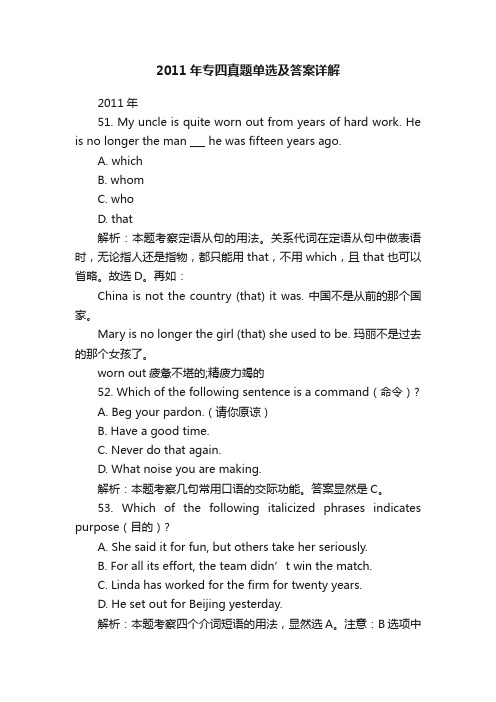
2011年专四真题单选及答案详解2011年51. My uncle is quite worn out from years of hard work. He is no longer the man ___ he was fifteen years ago.A. whichB. whomC. whoD. that解析:本题考察定语从句的用法。
关系代词在定语从句中做表语时,无论指人还是指物,都只能用that,不用which,且that也可以省略。
故选D。
再如:China is not the country (that) it was. 中国不是从前的那个国家。
Mary is no longer the girl (that) she used to be. 玛丽不是过去的那个女孩了。
worn out疲惫不堪的;精疲力竭的52. Which of the following sentence is a command(命令)?A. Beg your pardon.(请你原谅)B. Have a good time.C. Never do that again.D. What noise you are making.解析:本题考察几句常用口语的交际功能。
答案显然是C。
53. Which of the following italicized phrases indicates purpose(目的)?A. She said it for fun, but others take her seriously.B. For all its effort, the team didn’t win the match.C. Linda has worked for the firm for twenty years.D. He set out for Beijing yesterday.解析:本题考察四个介词短语的用法,显然选A。
日语专四2010年真题 大学日本语専攻四级能力试験问题(2010)4

大学日本語専攻四級能力試験問題(2010)(試験時間:160分)注意:解答はすべて解答用紙に書きなさい。
四、次の文の_に入れるのに最も適当な言葉を後のA、B、C、Dから一つ選びなさい。
(1×15=15点)46.スイッチを押しながら、左右の間_行ったり来たりする。
A、をB、でC、にD、へ47.甲:さっき小林さんという人_来ましたよ。
乙:そうですか。
小林さん_私の高校に時の友達です。
A、は・がB、が・がC、が・はD、は・は48.爆発がほたへ及ばない_、坑道に壁を作っていた。
A、ゆえにB、ようにC、ことにD、だけに49.花子は02年から大会に連続出場しているが、なかなか良い成績を出_。
A、せないでいるB、さないでいるC、せないであるD、さないである50.甲:明日、もう何も考えないことにしているの。
乙:人間は何も考えないで寝ていられる_がない。
A、ものB、はずC、ことD、ところ51.被災地に行ってみた_、あたりの家はほとんど水に浸かって、ひどい状態だった。
A、とたんB、ところC、せいかD、ために52.部屋の窓から公園で子供たちの遊んでいる_がよく見える。
A、ことB、ものC、のD、まま53.文化的素養の欠如も驚く_もので、ある統計では大学生の半分は、この一月に一冊も本を読んでいないらしい。
A、べきB、べくC、べからざるD、べからず54.本号からは内容を豊富にすべく11面から13面へとページを増やしました。
紙面_文字を若干大きくし、読みやすくしてあります。
A、にとってB、に対してC、についてはD、についても55.人間の体は、具合が悪くなったら薬を_いいというものではありません。
A、飲めばB、飲むからC、飲むならD、飲んでも56.運動は健康にいいと言われ_、運動すればするほど衰えるものがある。
A、たらB、てもC、ながらもD、ようと57.首相が政治生命を_「郵政民営化」についても、その成否について私は楽観的になれません。
大学日本语専攻生四级能力试験问题2011
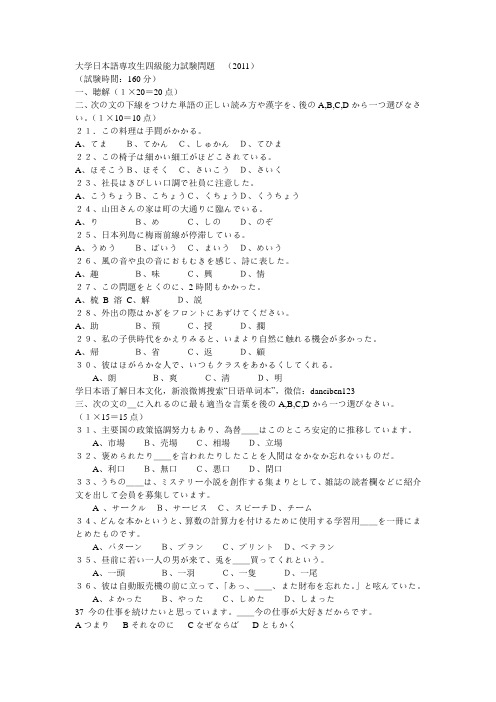
大学日本語専攻生四級能力試験問題(2011)(試験時間:160分)一、聴解(1×20=20点)二、次の文の下線をつけた単語の正しい読み方や漢字を、後のA,B,C,Dから一つ選びなさい。
(1×10=10点)21.この料理は手間がかかる。
A、てまB、てかんC、しゅかんD、てひま22、この椅子は細かい細工がほどこされている。
A、ほそこうB、ほそくC、さいこうD、さいく23、社長はきびしい口調で社員に注意した。
A、こうちょうB、こちょうC、くちょうD、くうちょう24、山田さんの家は町の大通りに臨んでいる。
A、りB、めC、しのD、のぞ25、日本列島に梅雨前線が停滞している。
A、うめうB、ばいうC、まいうD、めいう26、風の音や虫の音におもむきを感じ、詩に表した。
A、趣B、味C、興D、情27、この問題をとくのに、2時間もかかった。
A、梳B 溶C、解D、説28、外出の際はかぎをフロントにあずけてください。
A、助B、預C、授D、擱29、私の子供時代をかえりみると、いまより自然に触れる機会が多かった。
A、帰B、省C、返D、顧30、彼はほがらかな人で、いつもクラスをあかるくしてくれる。
A、朗B、爽C、清D、明学日本语了解日本文化,新浪微博搜索“日语单词本”,微信:danciben123三、次の文の_に入れるのに最も適当な言葉を後のA,B,C,Dから一つ選びなさい。
(1×15=15点)31、主要国の政策協調努力もあり、為替__はこのところ安定的に推移しています。
A、市場B、売場C、相場D、立場32、褒められたり__を言われたりしたことを人間はなかなか忘れないものだ。
A、利口B、無口C、悪口D、閉口33、うちの__は、ミステリー小説を創作する集まりとして、雑誌の読者欄などに紹介文を出して会員を募集しています。
A 、サークルB、サービスC、スピーチD、チーム34、どんな本かというと、算数の計算力を付けるために使用する学習用__を一冊にまとめたものです。
2011年日语 普通高等学校招生全国统一考试

2011年普通高等学校招生全国统一考试日语试题卷第一部分听力(共2节满分30分)第二部分日语知识运用(供40小题满分40分)16親__黙って、会社を辞めてしまったAでBにCへDを17 外___布団を干したまま出かけたAをBはCでDに18 猫は道の上__走っていたAはBをCとDが19 あの人は車に乗ってから目的地に着く__、ずっとしゃべっていた。
AまでBまでにCときDあと20 今度出された料理は好きなもの__嫌いなもののほうが多かった。
AよりBがちCにはDでは21一生懸命に走った__、間に合いませんでした。
AしBからCのでDのに22 父は若いときは医者に___。
AなりそうですBなりそうでしたCなりたかったそうですDなりたいそうでした23 授業が終わって、家へ__としたら、雨が降ってきました。
A帰るB帰りたいC帰ろうD帰るよう24先生、風を引いてしまいましたので、明日授業を__いただけないでしょうかA休まれてB休ませてC休んでD休んでみて25だめだと思っていた大学に合格して、まるで夢の__です。
AらしいBみたいCそうDよう26 花子さんはいつもにこにこしていて、_方ですね。
AやさしみたいBやさしらしいCやさしそうなDやさしような27 私たちをしかる母の言葉には、深い感情が__。
A込めますB込めさせていますC込めていますD込められています28 最近は正月を自宅で過ごさない人が増えて_。
AいきましたBありましたCみましたDきました29 おなかがすいていたので、料理を2人分食べて_。
AいたBしまったCおいたDあった30 背が高くなるように、毎日牛乳をたくさん___。
A飲んでいるB飲んであるC飲んでしまうD飲んでいく31話しながらコップを__1つ壊してしまった。
A洗えばB洗ってもC洗ったらD洗ったり32 箱を開けてみると、中に人形が__。
A入れましたB入りましたC入れていましたD入っていました33 このところ忙しかった__ですから、電話のしないで、ごめんなさいAことBものCはずDべき34 日本人の友達の__で、日本の生活に慣れてきた。
大学日本语四级试験 大学日语四级真题
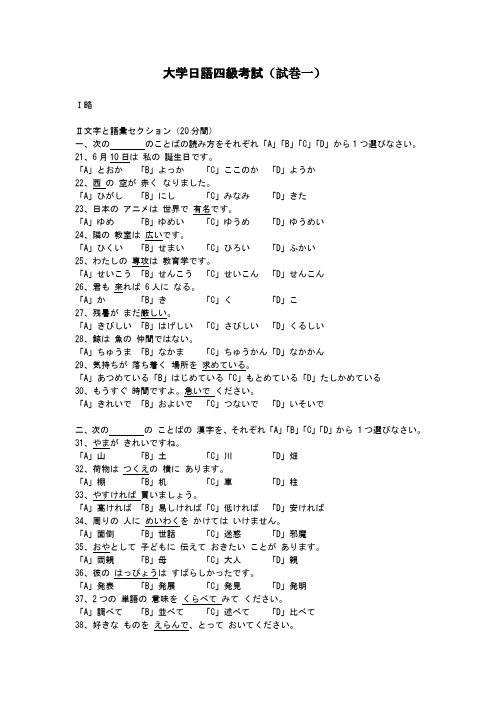
大学日語四級考試(試巻一)Ⅰ略Ⅱ文字と語彙セクション(20分間)一、次ののことばの読み方をそれぞれ「A」「B」「C」「D」から1つ選びなさい。
21、6月10日は私の誕生日です。
「A」とおか「B」よっか「C」ここのか「D」ようか22、西の空が赤くなりました。
「A」ひがし「B」にし「C」みなみ「D」きた23、日本のアニメは世界で有名です。
「A」ゆめ「B」ゆめい「C」ゆうめ「D」ゆうめい24、隣の教室は広いです。
「A」ひくい「B」せまい「C」ひろい「D」ふかい25、わたしの専攻は教育学です。
「A」せいこう「B」せんこう「C」せいこん「D」せんこん26、君も来れば 6人になる。
「A」か「B」き「C」く「D」こ27、残暑がまだ厳しい。
「A」きびしい「B」はげしい「C」さびしい「D」くるしい28、鯨は魚の仲間ではない。
「A」ちゅうま「B」なかま「C」ちゅうかん「D」なかかん29、気持ちが落ち着く場所を求めている。
「A」あつめている「B」はじめている「C」もとめている「D」たしかめている30、もうすぐ時間ですよ。
急いでください。
「A」きれいで「B」およいで「C」つないで「D」いそいで二、次ののことばの漢字を、それぞれ「A」「B」「C」「D」から 1つ選びなさい。
31、やまがきれいですね。
「A」山「B」土「C」川「D」畑32、荷物はつくえの横にあります。
「A」棚「B」机「C」車「D」柱33、やすければ買いましょう。
「A」高ければ「B」易しければ「C」低ければ「D」安ければ34、周りの人にめいわくをかけてはいけません。
「A」面倒「B」世話「C」迷惑「D」邪魔35、おやとして子どもに伝えておきたいことがあります。
「A」両親「B」母「C」大人「D」親36、彼のはっぴょうはすばらしかったです。
「A」発表「B」発展「C」発見「D」発明37、2つの単語の意味をくらべてみてください。
「A」調べて「B」並べて「C」述べて「D」比べて38、好きなものをえらんで、とっておいてください。
日语专四2011真题 大学日本语専攻生四级能力试験问题(2011)

大学日本語専攻生四級能力試験問題(2011)(試験時間:160分)注意:解答はすべて解答用紙に書きなさい。
第一部分一、聴解(1×20=20点)二、次の文の下線をつけた単語の正しい読み方や漢字を、後のA、B、C、Dから一つ選びなさい。
(1×10=10点)21.そんな下品な話はこの場にふさわしくない。
A.かひんB.けぴんC.げひんD.かぴん22.サクラの蕾はもう膨らんでいる。
A.つぼB.つぼみC.つぽみD.みのり23.この会社には機械の操作に熟練する労働者が尐ない。
A.そうさB.そうざくC.そうさくD.そうさう24.原子力発電所についてその建設の是非を問う声が聞こえる。
A.ぜせB.ぜせいC.ぜぴD.ぜひ25.友人と改札口で待ち合わせする。
A.かいさつぐちB.かいさつくちC.かいさつごうD.かいさつこう26.このクラスの生徒たちはよく教室でさわぐんだよ。
A.閙B.喚C.擾D.騒27.このごろ、ふところに金が一銭もなく、困っている。
A.袖B.懐C.包D.財布28.あの子はしつけが悪い。
A.師付B.執化C.叱D.躾第2頁(共11頁)29.島民の大半は空港建設賛成にかたむきつつある。
A.偏B.頗C.傾D.斜30.今度の事件は彼のしゅっせの妨げになるだろう。
A.出生B.終世C.出世D.終生三、次の文のに入れるのに最も適当な言葉を後のA、B、C、Dから一つ選びなさい。
(1×15=15点)31.どんな仕事でも一人前になるためには努力が必要だ。
A.かえざるB.さかえざるC.たえざるD.はえざる32.各々の持ち味をように工夫する必要があります。
A.まかすB.はなすC.ならすD.いかす33.こんな問題はもなく解決できる。
A.わけB.はずC.ものD.こと34.申告された件数はほんの一割程度にすぎない。
A.またB.まだC.もうD.そう35.今度の会見をに、両国関係は新たな局面を迎えた。
A.きっかけB.じつげんC.じっさいD.ひっかけ36.理由もなく急にそうなるさまを、日本語では「」という。
- 1、下载文档前请自行甄别文档内容的完整性,平台不提供额外的编辑、内容补充、找答案等附加服务。
- 2、"仅部分预览"的文档,不可在线预览部分如存在完整性等问题,可反馈申请退款(可完整预览的文档不适用该条件!)。
- 3、如文档侵犯您的权益,请联系客服反馈,我们会尽快为您处理(人工客服工作时间:9:00-18:30)。
大学日本語専攻生四級能力試験問題(2011)
(試験時間:160分)
注意:解答はすべて解答用紙に書きなさい。
六、読解問題
問題一、次の各文章を読んで、後の質問に答えなさい。
答えはそれぞれA、B、C、Dの中から最も適当なものを一つ選びなさい。
(1×5=5点)
【文章1】
頭痛がしたり咳が出たりして、ちょっと風邪気味だなと思った時に、薬局で風邪薬を買う人は多いが、わざわざ病院へ行く人は尐ないのではなかろうか。
しかし、そんな時でも①病院に行ったほうが得なのである。
というのも、薬局で販売している薬には消費税がかかっているが、病院でもらう医療用薬品にはかからないからだ。
また保険の関係で自分で支払う分も尐なくてすむ。
さらに薬そのものについて言うならば、医療用薬品に
含まれる有効成分は、薬局で買う薬に比べて倍以上であるケース[注]が多く、よく効く。
しかしながら、私の場合、特に大きな病院になると②そうなのだが、あの長い待ち時間を考えると、どうしても薬局で風邪薬を買うことのほうが多くなる。
[注]ケース/個個の事例。
71.①病院に行ったほうが得なのであるとあるが、なぜか。
A.薬局の薬は効果がないから。
B.薬局の薬のほうが高いから。
C.病院の薬のほうが税金が安いから。
第7頁(共11頁)
D.病院の薬はお金を払わなくてすむから。
72.②そうとあるが、ここではどういうことか。
A.病院でもらう薬はより効くこと
B.病院でもらう薬は安いこと
C.薬局で風邪薬を買うこと
D.長い時間待たされること
【文章2】
死体ははたして誰のものか。
①自分のものだとしても、死んだ後では、所有権を実際に自分で主張することはできない。
法的には、そこはどうなっているのか。
それを私はじつは知らないのである。
職業柄、年中扱っている「②もの」の、所有権が不明である。
そんなことで、よく仕事が勤まる。
そう③怒られそうだが、むろん常識的には、死体は遺族のものである。
73.①自分とはだれか。
A.死んだ人B.死んだ人の親C.死んだ人の子供D.解剖する医者
74.②ものとはなにか。
A.法律B.権利C.死体D.職業
75.③怒られそうだとあるが、だれに怒られるのか。
A.死体B.筆者C.子供D.遺族。
